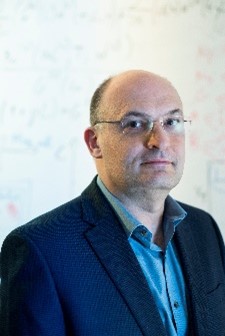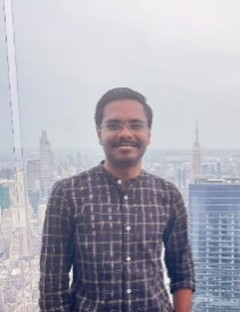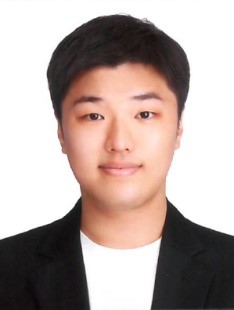Digital design of pharmaceutical processes using PharmaPy
No. of participants: 30
Duration: 4 hours
Requirements: Basic familiarity with Python
Workshop coordinator: Zoltan K Nagy, Purdue University
Participants: Rex Reklaitis (Purdue University), Yash Barhate (Purdue University),
Jungsoo Rhim (Purdue, University), Mohammad Shahab (Purdue University)
The use of digital tools in pharmaceutical manufacturing has gained traction
over the past two decades. Whether supporting regulatory filings or attempting
to modernize manufacturing processes to adapt to the ever evolving Industry
4.0 standards, engineers entering the workforce must exhibit a proficiency in
modeling, simulation, optimization, data processing, and other digital analysis
techniques.
We propose to have a 4-hour workshop, that will cover general concepts of pharmaceutical process modeling and digital design using the open-source tool, PharmaPy.
The workshop will describe the main features of PharmaPy, and how it can be used for process simulation, parameter estimation, and simulation-based optimization considering single unit operations as well as integrated process flowsheets. Case studies with applications in process synthesis and techno-economic analyses of process flowsheets including comparison of end-to-end batch, continuous and hybrid manufacturing routes will be included. All case studies will be taught using a web-based interactive computing platform.
The main objective of the workshop is to increase understanding of pharmaceutical
processes by in-silico process analysis using PharmaPy. After attending the
workshop, the participants are expected to:
1. Have a clear understanding of the modeled phenomena in the unit operations
(UOs) supported by PharmaPy
2. Use PharmaPy's modeling objects to analyze individual UOs
3. Perform parameter estimation by integrating UO objects into a simulation
executive
4. Connect multiple UOs in different operating modes to analyze pharmaceutical
manufacturing
5. Perform process optimization by clear understanding of problem formulation
and use of user-defined simulation callbacks
6. Propose approaches to improve process performance using PharmaPy
Topics to be included:
1. Introduction to PharmaPy
a. Contextualization/motivation: PharmaPy
b. PharmaPy architecture: fundamentals
2. Introduction to modeling of pharmaceutical processes
a. Reactors
b. Crystallization
c. Filtration, drying
d. Feeder, blender, tableting
3. Examples of applications of PharmaPy
a. Digital twin development for reactors and design space analysis
b. Digital design and nonlinear real-time optimization of an integrated crystallization-filtration-drying
system
c. Techno-economic analysis of batch, continuous and hybrid manufacturing systems
d. Process synthesis of optimal pharmaceutical manufacturing systems
Hands-on workshop
4. Case study I. Parameter estimation for reaction systems
a. Batch reactor modeling in PharmaPy: unit operation and kinetic models
b. SimulationExec class: use of the simulation executive to run parameter estimation
c. Parameter estimation
5. Case study II: Process optimization in PharmaPy
a. Modelling of crystallization systems: fundamentals
b. Formulation of an optimization problem for crystal size maximization
c. Creation of PharmaPy callback functions to enable optimization
d. Solving the optimization problem and analyzing the converged results
6. Case study III: Flowsheet analysis with PharmaPy
a. PharmaPy flowsheet capabilities
b. Creating a flowsheet graph
c. Running flowsheet in simulation mode
d. Function callbacks and optimization
Resources:
Training material and PharmaPy installation is available at: http://www.pharmapy.co
Participants are requested to download and install Python and PharmaPy before
the workshop following the instructions on the website.
Papers with examples:
1. D. Casas-Orozco, D. Laky, V. Wang, M. Abdi, X. Feng, E. Wood, G.V. Reklaitis,
Z.K. Nagy, Techno-economic analysis of dynamic, end-to-end optimal pharmaceutical
campaign manufacturing using PharmaPy, AICHE J., 69 (9), e18142, 2023.
2. D. Casas-Orozco, D. Laky, J. Mackey, G.V. Reklaitis, Z.K. Nagy, Reaction
kinetics determination and uncertainty analysis for the synthesis of the cancer
drug lomustine, Chem. Eng. Sci., 275, 118591, 2023.
3. I. Hur, D.M. Casas-Orozco, D.J. Laky, F. Destro, Z.K. Nagy, Digital design
of an integrated purification system for continuous pharmaceutical manufacturing,
Chem. Eng. Sci, 285, 119534, 2024.
4. D. Laky, D. Casas-Orozco, C.D. Laird, G.V. Reklaitis, Z.K. Nagy, Simulation-optimization
framework for the digital design of pharmaceutical processes using Pyomo and
PharmaPy, Ind. Eng. Chem. Res., 61 (43), 16128-16140, 2022.
5. D.M. Casas-Orozco, D.J. Laky, V. Wang, M. Abdi, X. Feng, E. Wood, C. Laird,
G.V. Reklaitis, Z.K. Nagy, PharmaPy: an object-oriented tool for the development
of hybrid pharmaceutical flowsheets, Comp. & Chem. Eng., 107408, 2021.
 Zoltan K Nagy is the Arvind
Varma Professor of Chemical Engineering in the Davidson School of Chemical Engineering
at Purdue University, and Professor of Process Systems Engineering at Loughborough
University, UK.
Zoltan K Nagy is the Arvind
Varma Professor of Chemical Engineering in the Davidson School of Chemical Engineering
at Purdue University, and Professor of Process Systems Engineering at Loughborough
University, UK.
He received his B.S. (1994), M.Sc (1995) and PhD (2001) degrees from the "Babes-Bolyai"
University of Cluj, Romania. His research focuses on pharmaceutical systems
engineering, process intensification and advanced process control, crystallization
modeling and control approaches and advanced control of particulate systems,
with application to pharmaceuticals, fine chemicals, food and energetic materials.
He has published over 250 journal papers, 300 conference proceeding papers,
6 patents and cofounded three companies.
He has graduated over 50 PhD students and postdocs in the UK and USA. He has
received awards in the areas of crystallization and control from IEEE, IFAC,
European Federation of Chemical Engineering, Royal Academy of Engineering and
the European Research Council and he was the recipient of the AIChE's Excellence
in Process Development Research Award (2018) and the Pharmaceutical Discovery
Development and Manufacturing (PD2M) Forum Award for Outstanding Contribution
to QbD for Drug Substance (2019).
 Gintaras.V. (Rex) Reklaitis
is Gedge Distinguished Professor of Chemical Engineering at Purdue University
with courtesy appointment in Industrial and Molecular Pharmaceutics. His research
expertise lies broadly in process systems engineering, with recent focus on
applications to improve pharmaceutical product design, development, manufacture
and delivery.
Gintaras.V. (Rex) Reklaitis
is Gedge Distinguished Professor of Chemical Engineering at Purdue University
with courtesy appointment in Industrial and Molecular Pharmaceutics. His research
expertise lies broadly in process systems engineering, with recent focus on
applications to improve pharmaceutical product design, development, manufacture
and delivery.
Specific themes include continuous drug substance and drug product manufacturing,
digital twin development and exploitation, additive manufacturing of oral dosage
products and Bayesian approaches to precision dosing. Educated at the Illinois
Institute of Technology (BS ChE), and Stanford University (MS & PhD), he
is a member of the US National Academy of Engineering, fellow of AIChE and AAAS,
and past Editor-in-Chief of Computers & Chemical Engineering.
He is recipient of the John M Prausnitz, Warren K Lewis, Van Antwerpen and Computing
in Chemical Engineering Awards of AIChE , the Pruitt Award (CCR), and the Long
Term Achievements in Computer Aided Process Engineering Award (EFChE).
He has served on the Board of Directors of AICHE, the Council for Chemical Research
and the CACHE Corporation and continues to serve on the editorial boards of
several journals. He recently chaired the National Academies Committee to Identify
Innovative Technologies to Advance Pharmaceutical Manufacturing. He has published
over 350 papers and book chapters and edited/authored nine books.
 Yash Barhate is a 3rd-year
PhD candidate at Purdue University working in Prof. Zoltan Nagy's research group.
His work revolves around the mathematical modeling and process optimization
of integrated process systems, with a particular emphasis on crystallization
processes in pharmaceutical manufacturing.
Yash Barhate is a 3rd-year
PhD candidate at Purdue University working in Prof. Zoltan Nagy's research group.
His work revolves around the mathematical modeling and process optimization
of integrated process systems, with a particular emphasis on crystallization
processes in pharmaceutical manufacturing.
 Jungsoo Rhim is a 4th year graduate
student in the doctoral program being co-advised in the Aeronautics & Astronautics
Engineering and Chemical Engineering departments. His main field of research
is the development of technoeconomic cost models for pharmaceutical processes
and system engineering. In his free time he enjoys baking and reading as a hobby.
Jungsoo Rhim is a 4th year graduate
student in the doctoral program being co-advised in the Aeronautics & Astronautics
Engineering and Chemical Engineering departments. His main field of research
is the development of technoeconomic cost models for pharmaceutical processes
and system engineering. In his free time he enjoys baking and reading as a hobby.
 Mohammad Shahab is a postdoctoral
research associate at Purdue University. His research area includes digital
design of integrated downstream pharmaceutical manufacturing systems, specifically
on process modeling, optimization and condition monitoring of direct compaction
and dry granulation processes.
Mohammad Shahab is a postdoctoral
research associate at Purdue University. His research area includes digital
design of integrated downstream pharmaceutical manufacturing systems, specifically
on process modeling, optimization and condition monitoring of direct compaction
and dry granulation processes.
